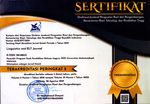Examining Self-Efficacy and Language Anxiety of Theological Seminary Students
Abstract
This article examined self-efficacy and language anxiety about using English as a foreign language experienced by theological seminary students. Specifically, it explored whether students confident in their language skills would feel less anxious or vice versa. It also aims to discover the strategies students used to overcome language anxiety. A mixed-methods study involving 36 theology students who were asked to complete a questionnaire and 10 of them were also interviewed in depth. The results showed that there was a positive trend, self-efficacy was not always directly or linearly proportional to anxiety levels. However, from the interviews, it was found that some ways help students reduce their anxiety when speaking in a foreign language. Overall, this study highlighted the importance of self-efficacy in foreign language learning, especially for theology students. By increasing students' self-efficacy, theological education institutions can help them by providing facilities or encouragement to achieve better academic performance and be ready to face all challenges in their future ministry tasks.
Keywords
Full Text:
PDFReferences
A. Alamer and F. Almulhim, “The Interrelation Between Language Anxiety and Self-Determined Motivation; A Mixed Methods Approach,” Front. Educ., vol. 6, 2021, doi: 10.3389/feduc.2021.618655.
Albert Bandura, “Albert Bandura Self-Efficacy: The Exercise of Control,” W.H Freeman and Company New York, vol. 43, no. 9. pp. 1–602, 1997.
M. Szota, A. . Rogowska, A. Kwasnicka, and K. Chilicka-Hebel, “The Indirect Effect of Future Anxiety on the Relationship between Self-Efficacy and Depression in a Convenience Sample of Adults: Revisiting Social Cognitive Theory,” J. Clin. Med., vol. 13, no. 16, 2024, doi: 10.3390/jcm13164897.
Y. Xu and Z. Xie, “Exploring the predictors of foreign language anxiety: the roles of language proficiency, language exposure, and cognitive control,” Front. Psychiatry, vol. 15, 2024, doi: 10.3389/fpsyt.2024.1492701.
E. K. Horwitz, M. B. Horwitz, J. Cope, E. K. Horwitz, M. B. Horwitz, and J. Cope, “The Foreign Language Classroom,” Foreign Lang. Classr., vol. 70, no. 2, pp. 125–132, 1995, doi: 10.4324/9780203820858.
C. A. M. Estrada and M. F. T. C. Lomboy, “Religious education can contribute to adolescent mental health in school settings,” Int. J. Ment. Heal. Syst., vol. 13, no. 28, 2019, doi: 10.1186/s13033-019-0286-7.
H. Mulyono, A. R. Liestyana, S. Warni, G. Suryoputro, and S. K. Ningsih, “Indonesian Students’ Anxiety To Write in English As a Foreign Language Across Gender and Educational Levels,” Probl. Educ. 21st Century, vol. 78, no. 2, pp. 249–262, 2020, doi: 10.33225/pec/20.78.249.
Oktamia Anggraini Putri, “Jurnal Pendidikan dan Konseling,” J. Pendidik. dan Konseling, vol. 4, no. 20, pp. 1349–1358, 2022.
Y. Haidara, “Psychological Factor Affecting English Speaking Performance for the English Learners in Indonesia,” Univers. J. Educ. Res., vol. 4, no. 7, pp. 1501–1505, 2016, doi: 10.13189/ujer.2016.040701.
Z. Song, “Foreign Language Anxiety: A Review on Definition, Causes, Effects and Implication to Foreign Language Teaching,” J. Educ. Humanit. Soc. Sci., vol. 26, 2024, doi: 10.54097/4838f411.
T. Gregersen, “Dynamic Properties of Language Anxiety,” Stud. Second Lang. Learn. Teach., vol. 10, no. 1, 2020, doi: 0000-0003-0744-9655.
M. Papi and H. Khajavy, Second Language Anxiety: Construct, Effects, and Sources. Publish Online Cambridge University Press, 2023.
Z. Bárkányi, “Motivation, self-efficacy beliefs, and speaking anxiety in language MOOCs,” ReCALL, vol. 33, no. 2, pp. 143–160, 2021, doi: 10.1017/S0958344021000033.
J. Fu, Y. Ding, K. Nie, and G. H. K. Zaigham, “How does self-efficacy, learner personality, and learner anxiety affect critical thinking of students,” Front. Psychol., vol. 14, no. December, pp. 1–11, 2023, doi: 10.3389/fpsyg.2023.1289594.
S. Zhou, M. Chiu, Z. Dong, and W. Zhou, “Foreign language anxiety and foreign language self-efficacy: a meta-analysis,” Curr. Psychol., vol. 42, pp. 1–15, Dec. 2022, doi: 10.1007/s12144-022-04110-x.
P. D. MacIntyre and R. C. Gardner, “The Subtle Effects of Language Anxiety on Cognitive Processing in the Second Language,” Lang. Learn., vol. 44, no. 2, pp. 283–305, 1994, doi: 10.1111/j.1467-1770.1994.tb01103.x.
S. Vanniarajan, “Language Learning Strategies: What Every Teacher Should Know by Rebecca L. Oxford,” Issues Appl. Linguist., vol. 1, no. 1, 1990, doi: 10.5070/l411004984.
G. Mettasari, “Self-Esteem , Achievement Motivation , Self- Efficacy and Students ’ Anxiety in Speaking,” 2006.
E. Mede, “The Predictor Roles of Speaking Anxiety and English Self Efficacy on Foreign Language Speaking Anxiety,” vol. 6, no. 1, pp. 117–131, 2017.
“18 a_3_Annisa_ Qurnia_16018007_2574_2020.” .
J. Creswell, “Qualitative Inquiry & Research Design: Choosing Among Five Approaches,” SAGE Publ., vol. 11, Jan. 2013.
D. Huyler and C. M. McGill, “Research Design: Qualitative, Quantitative, and Mixed Methods Approaches, by John Creswell and J. David Creswell. Thousand Oaks, CA: Sage Publication, Inc. 275 pages, $67.00 (Paperback).,” New Horizons Adult Educ. Hum. Resour. Dev., vol. 31, no. 3, pp. 75–77, 2019, doi: 10.1002/nha3.20258.
R. Schwarzer, M. Jerusalem, and M. Johnston, “Generalized Self-Efficacy Scale,” no. January, 1995.
F. Download et al., “[ PDF ] An Introduction To Qualitative.”
I. O. Ubi, E. I. Orji, and A. W. Osang, “Knowledge and Practice of Ethical Consideration for Quality of Research Skills among Graduate Students of Universities in Cross River State, Nigeria,” Mediterr. J. Soc. Sci., vol. 11, no. 5, p. 55, 2020, doi: 10.36941/mjss-2020-0055.
M. R. Roberts, S. Ashrafzadeh, and M. M. Asgari, “Research Techniques Made Simple: Interpreting Measures of Association in Clinical Research,” J Invest Dermatol, vol. 139, no. 3, pp. 502–511, 2019, doi: 10.1016/j.jid.2018.12.023.
M. Bunge, “Mind and Society,” Bost. Stud. Philos. Hist. Sci., vol. 287, pp. 181–199, 2010, doi: 10.1007/978-90-481-9225-0_10.
R. F. Baumeister and M. R. Leary, “The Need to Belong: Desire for Interpersonal Attachments as a Fundamental Human Motivation,” Interpers. Dev., vol. 117, no. 3, pp. 57–89, 2017, doi: 10.4324/9781351153683-3.
J. H. Flavell, “Metacognition and cognitive monitoring: A new area of cognitive-developmental inquiry.,” Am. Psychol., vol. 34, no. 10, pp. 906–911, 1979, doi: 10.1037//0003-066x.34.10.906.
D. H. Schunk, “Self efficacy and classroom leaming,” Psychol. Sch., vol. 22, pp. 208–223, 1985.
S. F. Lumintang and Z. Aminin, “The Effect of Video Blogging as Learning Media for Students’ Speaking Skills,” J. English Lang. Educ., vol. 9, no. 1, pp. 27–34, 2024.
N. Mills, F. Pajares, and C. Herron, “A reevaluation of the role of anxiety: Self-efficacy, anxiety, and their relation to reading and listening proficiency,” Foreign Lang. Ann., vol. 39, no. 2, pp. 276–295, 2006, doi: 10.1111/j.1944-9720.2006.tb02266.x.
DOI: https://doi.org/10.31764/leltj.v12i2.27935
Refbacks
- There are currently no refbacks.
Copyright (c) 2024 Sheline Feranda Lumintang, Barli Bram

This work is licensed under a Creative Commons Attribution-ShareAlike 4.0 International License.
_____________________________________________________
Linguistics and ELT Journal
p-ISSN 2339-2940 | e-ISSN 2614-8633

LELTJ is licensed under a Creative Commons Attribution-ShareAlike 4.0 International License.
_____________________________________________________
LELTJ is abstracting & indexing in the following databases:
_____________________________________________________
LELTJ Editorial Office:













